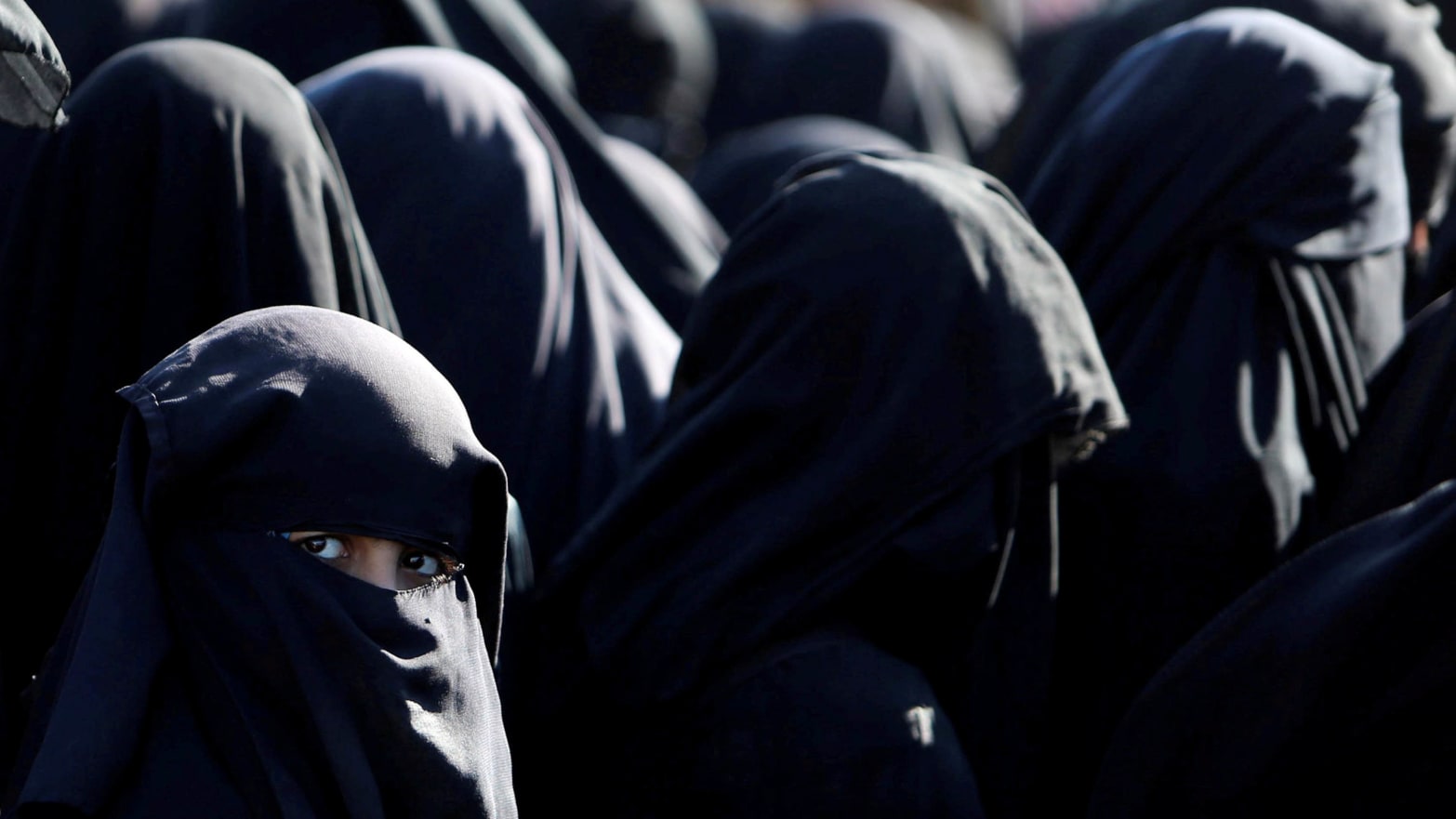“Do you know any way to get me transferred to Camp al Hol?” asks an ISIS prisoner in a neighboring camp texting from one of the illicit phones passed around among the detainees. If the guards from the Syrian Democratic Forces (SDF) catch her with it there will be hell to pay, but all she’s thinking about is how she can get out.
To stay in SDF custody, she believes, is to face the growing threat of attacks on the largely Kurdish-led SDF by Turkish-backed rebels, and rapes and assaults that have gone along with that, plus the Turkish bombardments in the region, and now the spread of COVID-19 in Syria.
There was a time when U.S. special operations forces helped keep the prisons, the prisoners–and the SDF troops–secure. But that time ended last year when U.S. President Donald Trump pulled the plug on America’s SDF allies, the soldiers who did the vital fighting and dying on the ground in the war to crush the so-called Islamic State. Since then a much more tenuous and treacherous modus vivendi has taken shape, with much less American influence.
Previously this prisoner had texted us that she had the opportunity to escape but passed it up because she had turned herself in to the SDF with the express wish to be repatriated and face justice at home in the West. But now, seeing the steady stream of ISIS females escaping from al Hol, she’s having second thoughts. Maybe freedom is an option for her.
Indeed, there have been multiple escapes from Camp al Hol, most of them facilitated with bribes to local guards in the amounts of $3,000 to $4,500 per person. Hundreds of women, many from Europe, escaped another camp, Ain Issa, when it was bombarded during the Turkish invasion of North East Syria in the fall of 2019.
Lisa Smith from Ireland and Bouchra Abouallal from Belgium, both of whom escaped from Ain Issa camp, were among some of the women who made their way toward Turkey, trying to get home, possibly meaning to turn themselves in. Lisa Smith made it and is now facing justice at home in Dublin; Bouchra remains detained in a Turkish prison, although her children have been brought back to Belgium, where they were born before their parents joined ISIS.
GO FUND ISIS
Evidence has grown over the last year of fundraising in Europe to pay for escapes and smuggling operations out of Al Hol. Richard Hall of the Independent reported that an operation called “Justice for Sisters” was launched in June of 2019 with the help of an intermediary in Germany using an online crowdfunding campaign aiming to raise money from European sympathizers.
Another campaign reported at the same time by the Kurdish Rojava Information Center was explicitly raising funds via the popular encrypted messaging app Telegram and PayPal to pay smugglers to help women in Camp Hol escape.
To avoid takedowns by PayPal, the fundraising campaigns were given names like “Honeymoon in Vienna” by their ISIS-supporting organizers. In July, the Telegram channel was closed, but whether it resurfaced under another heading is unknown to us.
Similarly, operatives in Idlib have run a campaign called “Free the Female Prisoners” that claims to have had success getting four women out of the camp. That campaign released a poster on Telegram stating, “$8,000 secures the full release of a sister and the Golden share $4,000 covers half the cost.”
Hall writes about how money may be moved to foreign women in Camp al Hol: “Money transfer facilities are present in the main part of the camp, and foreign detainees could in theory receive money with the help of a Syrian living in the camp.” We would add that ISIS women could also make illicit arrangements with local Syrians who sell them food and other supplies.
The International Center for the Study of Violent Extremism (ICSVE) recently discovered “Justice for Sisters” on Instagram, with one of the accounts looking like its run from al Hol camp, most likely via an illicit phone. The women detained in al Hol, pictured in full opaque niqabs, wrote that they needed $7,500 to escape. While many of the posts are written in German, a few are written in Arabic and English. One English post noted the lack of electricity and medication, “causing viruses to spread rapidly.” The women pleaded for funds “in our hour of need.”
They also posted an ISIS propaganda video promising “the punishment of the Burning Fire” to “those who have tortured the believing men and believing women.”
In the caption for the video, the women suggested that those who donated would be helping the family of a shaheed, a “martyr” according to ISIS’s warped interpretation of Islam, meaning that at least one of each woman’s husbands was killed while fighting for ISIS. (Under the Islamic State, women who lost their husbands in combat were directed to marry other fighters right away.)
Another video showed women reading a message in German, English, and Arabic. This Instagram account also features Instagram stories with photos and videos of ISIS fighters and their families in ISIS’s last stronghold of Baghouz, plus requests for cash donations displayed in international currency, and the pictures showing the dire conditions in al Hol.
That account bio includes links to two other Instagram accounts apparently not run from al Hol. One, supposedly run by a man, posted photos and videos of the women in al Hol. His content was almost exclusively in German. Another account posted a link to a PayPal account as well as an address in Germany where supporters could go to offer “help and support.” Most of the photos posted by this account were of women and their children in al Hol,
THE ESCAPEES
The women who have escaped from the SDF-run camps are many. Hayat Boumedienne, partner of Amedy Coulibaly who was one of the perpetrators of the horrific January 2015 attacks in Paris, France, is one of 13 French jihadists who have escaped from SDF camps. "Some were married to well-known jihadists, others made propaganda and appeared in the magazines of the Islamic State organization" says Jean-Charles Brisard, cofounder of the Paris-based Terrorism Analysis Center told Agence France Presse last week.
Boumedienne fled France shortly before the Paris attacks on the Charlie Hebdo satirical papers and Coulibaly’s hostage taking and assault at a kosher supermarket in 2015. Boumedienne was in the company of Mahdi Sabri Belhoucine, the brother of a jihadist notorious in France, as she crossed from Turkey into Syria. She is believed to have been at least peripherally involved in the attacks.
Boumedienne was thought to have died in Syria until recent evidence surfaced in French courts placing her in Camp al Hol in October 2019, according to the testimony of a woman who was detained alongside her. However, she is now believed to have escaped alongside 13 other French women who were detained in al Hol and Ain Issa camps. This number of ISIS female escapes amounts to 10 percent of the French women detained in Syria, according to Brisard.
“People try to escape every day, and people do escape every week,” a camp administrator from Al Hol told Lindsey Snell of The Investigative Journal in February of 2020. She pointed out that some wanted to settle in Idlib or Deir Ezzor, but that most wanted to cross out of Syria to Turkey.
According to an unnamed Turkish journalist cited by Snell, women are assisted by the Turkish military in Jarabulus and Manbij to make their way into Turkey. We have not been able to confirm that specific claim, but it would fit with ICSVE interviews in which ISIS members claim that Turkish intel and military officials helped them in earlier years when they needed to cross the border from Syria into Turkey for various reasons.
The SDF acknowledges these escapes, most recently confirming that four Turkish women, Hatice Güneş, Hafsa Güneş, Beyza Güneş, and Berire Güneş, escaped on December 21, 2019, from al Hol Camp.
Such incidents “confirm the inability of local authorities to guarantee the detention of foreign jihadists, whether in prisons or in camps, in which mutinies and attempted escape occur regularly,” says Brisard. He goes on to say that they may join the ranks of terrorists currently operating in Syria and Iraq, strengthening them, or disperse to other countries.
They may also head home secretly to plan and carry out further attacks like those that plagued many European capitals in recent years. Brisard’s organization, like many others, advocates for repatriation of these ISIS prisoners held by the SDF so they can be tried by European laws, held securely in Western facilities and if possible be rehabilitated before their ultimate release back into society.
REBUILDING ISIS
When considering these ISIS escapes one should keep in mind that al Qaeda in Iraq pursued a strategy it called “Breaking the Walls” in 2012 to free enough former jihadists to strengthen their ranks. The result: they rose again as ISIS—which was by 2014 the most ambitious and powerful jihadi terrorist group in history.
ISIS leader Abu Bakr al Baghdadi (who didn’t have to escape from U.S. custody in Iraq a decade earlier, but was released), urged his followers in his final video months before he was killed last October to free ISIS prisoners. Other ISIS supporters have since echoed his call. ISIS men held in al Hasakah prison in SDF territory have rioted multiple times recently, once taking over an entire floor of the prison for several days. Eventually the riots were quelled and the SDF says those who escaped were recaptured.
According to careful instructions given to us before interviewing ISIS prisoners in January 2020, the SDF has tried to keep news of Baghdadi’s speech, and even of his death, hidden from male prisoners. The belief is that if they learned of either they would become more violent, riot or try to escape.
The women, however, clearly are aware. When we visited the SDF camps in August and September of 2019, the prison guards told us the die-hard women enforcers of ISIS were roaming the camps sharing news of Baghdadi’s speech and telling their “sisters” that it wouldn’t be long until their men would come to break them out of the prison.
This news was so frightening to some of the disillusioned women that one German in Al Hol asked me, while trembling in fear, if it was true that ISIS would be coming back to reclaim them.
Amarnath Amarsingam a Canadian counter-terrorism researcher, tweeted a similar observation from his visit to Camp al Hol in October 2019: “Baghdadi speech calling for a prison break had profound impact inside camps/prisons [with ISIS] women feeling ISIS leader still cares about them.”
WHO'S RESPONSIBLE?
While the SDF has been a vital ally for the Global Coalition to Defeat ISIS, bravely fighting on the ground and imprisoning thousands of jihadists, it currently struggles with many challenges trying to hold the captives.
There is severe overcrowding since one prison in a highly populated area was shut down after the Turks bombed it. There are not enough resources to pay the staff. And there’s no clear plan for how to move forward. None at all.
While the SDF has asked repeatedly for Western countries to repatriate their ISIS detainees, there has been little to no positive response from Europeans. In the absence of repatriations, the SDF requested assistance to build and staff new prisons and train guards in state-of-the-art terrorist prison protocols, and also to fund rehabilitation programs. Moreover, they have requested an international tribunal, hybrid court, or, lacking that, support for using local courts to prosecute these ISIS prisoners.
And while the members of the international community, particularly Europeans, have been balking at repatriations, they also have been loath to deal with the SDF directly. Many want to avoid the ire of Turkey, which claims the group is a part of the PKK insurgency recognized internationally as a terrorist organization. European politicians also are reluctant to deal on such sensitive matters with this non-state actor.
U.S. military sources speaking to ICSVE have said many times that they have no evidence of the SDF ever launching attacks into Turkey from Syrian soil, except when they were defending themselves during the Turkish incursion into SDF territory in the fall of 2019. And today, while much of the SDF’s veteran leadership is Kurdish, most of its rank and file is now made up of Arabs, according to a recent report published by The Wilson Center in Washington.
In any case, if ISIS detainees are not to be repatriated there is no question that the SDF needs assistance to hold the detainees securely.


